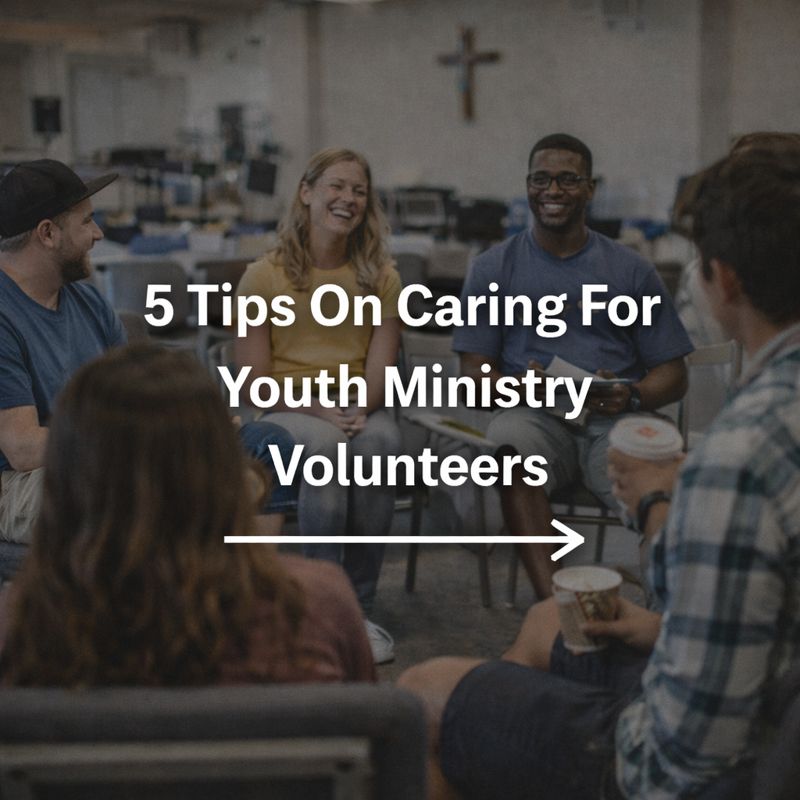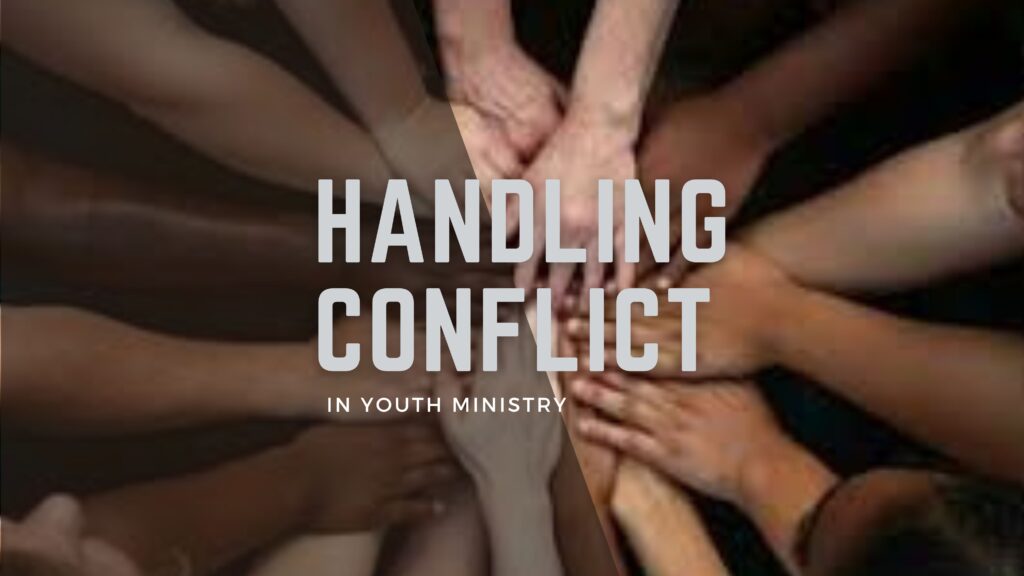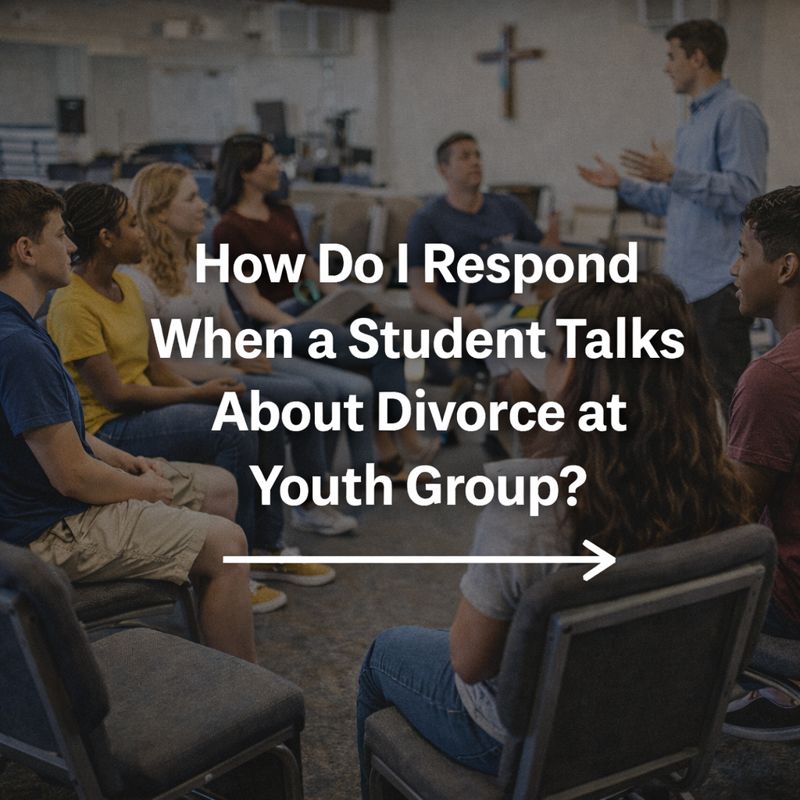
5 Tips On Caring For Youth Ministry Volunteers
It’s a fact: we could not do youth ministry or have a thriving group without our volunteers. Volunteer leaders allow

Before we talk about conflict in youth ministry, let’s establish a universal truth. There are two types of people in this world: those who run away from conflict and those who run into it head-on. Personally, I’ve always been the former. The people pleaser in me would simply like to agree, avoid, or avert in order to move away from tense situations. Because that is what conflict had always made me feel – tense.
Yet despite my tactics for avoiding conflict, running a ministry has a funny way of throwing you right into it. I’m sure you can agree that when you’re working with people, some sort of conflict is just naturally going to arise. People are broken. When broken people are with other broken people, disagreements happen. So, since we can’t avoid conflict, how do we deal with it?
Let’s start by considering that maybe, just maybe, conflict doesn’t have to be tense. Actually, instead of avoiding it, we can embrace it! Working through tough situations and differing opinions can actually bring people together and deepen relationships when handled with care. As youth ministers, we have the privilege of facilitating that care as well as bringing unity and respect into conflict.
Something else we need to recognize and consider when it comes to conflict in youth ministry is that it can come from many different directions. You might be part of the conflict, or you might not be. It might come from your leaders, students, or parents. You might witness the conflict, or you might hear about it after it happened. There are many variables that could be at play. But the structure for how we deal with conflict is going to remain the same.
The following are some tips I’ve used in ministry to help work through conflict and embrace the learning opportunity set before us. But before we jump in, here’s our best youth ministry series on conflict:
It is so easy to jump in with both feet and start talking. Our natural instinct is to want to solve problems, share advice, or defend ourselves. However, when conflicts arise, one of the most important things we can do is just listen. It might seem simple but allowing other people to know they are truly being heard can be monumental.
Listen to how you’re feeling– access your reaction to the conflict before you jump in. We don’t want to come at it emotionally charged.
Listen for background information – where is this conflict stemming from? What is the root we need to reach?
Listen for feelings – are they hurt? Frustrated? Feeling unseen?
Listen for neutral ground– where are areas in the conflict both parties might agree on? How can we remove the idea of opinion vs. opinion and work together as a team?People want to be heard. When people know they are being heard a lot of tension gets dissolved.
As I mentioned before, conflict can come from various directions so we have to understand what role we play in the particular situation and how we are authorized to handle it. Is this a conflict that is coming at you to be part of or is it something you need to mediate? Is a third party necessary to solve the issue at hand? Is this a conflict that I need to initiate because there has been chaos or confusion?
Once you can answer these questions you can figure out what role you play. This detail is important to know because it not only affects how to respond but prepares you for the way the other people involved are going to respond to you. Additionally, this affects how you are able to move forward in solving the conflict. For example, if a systemic issue arises, you need to assess whether or not you are authorized to make the changes needed, and if not, who is?
We don’t want to approach conflict as a person-against-person game. Instead, we need to set some ground rules so that we can come together to be us (or the group) against a problem. When ground rules are set, everyone involved can remain on the same page, listen to one another, and take responsibility for the outcome.
Here are a couple of examples:
-No shouting
-Make sure you understand what each party is saying – restate what you’ve heard to ensure you truly grasp the issue
-Don’t make threats
-Show grace
-Be honest
Ground rules help everyone know what to expect and keep conversations moving forward with respect instead of animosity.
One of the things my lead pastor often reminds us of is to be a “non-anxious presence.” As someone who would love to run from conflict and naturally gets stirred up, I am constantly reminding myself of this and I have found it so helpful in leadership.
Being a non-anxious presence means you remain steady and calm when things get shaky.
Find tactics that help you remain a non-anxious presence:
-Breathing
-Taking a step away to assess the situation
-Meditate on scripture (“Gracious words are a honeycomb, sweet to the soul and healing to the bones” Proverbs 16:24)
As leaders, if we bring stress and anxiety into a situation or meet conflict with more conflict, we are only adding fuel to the fire. When we remain calm, other people can match our calm. When we remain calm, people know that we are a safe place to bring their conflicts and hard conversations.
“This conflict will not undo us. Our commitments to one another – the bonds that connect us – are more important than this division. This issue is serious and we will deal with it without sweeping it under the rug. But we are strong enough as a group to learn from this moment and to grow from it.”
This saying comes from a professor I had in seminary and I’ve used it more times than I can count in ministry. It is so easy to get caught up in emotions and demonize people, forgetting that the bond we share in Christ far surpasses any conflict we might be facing. Additionally, this phrase creates neutral ground. Again, we can now try to move forward as a team despite the issues we are up against.
If we can face conflict with this in mind, we’ll be able to create a strong community that can weather any storm.
See, conflict doesn’t have to be scary, nor do we have to forcefully approach it. When (not if) conflicts arise, we can be prepared to handle them well so that the ministry God has entrusted us with will continue to thrive in unity, not division.
I pray that we can see conflict as learning opportunities and new ways to love the people around us the same way Jesus has shown His love to us.
Check out more Youth Ministry Tips HERE

It’s a fact: we could not do youth ministry or have a thriving group without our volunteers. Volunteer leaders allow

If you’ve been in youth ministry longer than a few years, you’ve had a student bring up divorce at youth

Every single youth leader has felt this tension before: students on their phones during youth group. You work hard to